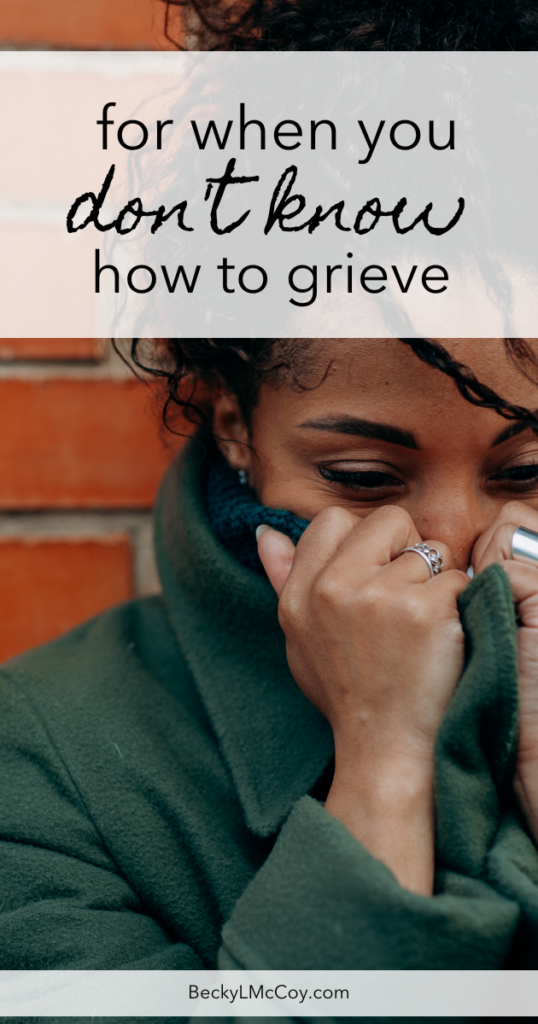For When You Don’t Know How To Grieve

After my dad died, I really struggled. Yes, I was sad and angry and grieving his loss. He had died on the East Coast 8 hours after my son was born on the West Coast. There was a big emotional burden to carry and I assumed if I could just live “normally,” the grief would go away because I would force myself into acceptance. If I was totally fine, I wouldn’t have to slow down and face the grief.
But that’s not how grief works. Grief sits with you as a constant companion. Over time it shrinks until you can just carry it in your pocket, but unless you give it the attention and energy it requires, it will only grow as it follows you around. I lived like I wasn’t grieving — I was sad now and then, but I wasn’t letting it slow me down — but I wasn’t doing well.
I had a newborn, so I couldn’t just withdraw from life and focus on healing for a while. I didn’t want to withdraw, even if I’d had the freedom to do that. But outliving the grief wasn’t working either.
How, then, do we grieve when we cannot give it our full attention? What do we do when we don’t know how to grieve? I can’t give you a recipe for grief, but here are a few of the things that have helped me:
- Set time aside to sit with whatever emotions I’m experiencing. Sometimes it’s only 10-20 minutes. Other times I have a few days to myself. Regardless of how much time I have, if I am not intentional about letting myself grieve, I won’t.
- Check in with your body. I try to practice regular body scans where I identify tension in my body. Seeing a massage therapist regularly and meeting my body’s needs (think food, water, sleep) has helped my body be able to process the grief without completely breaking down.
- Acknowledge what you’re feeling (sometimes I call it “admitting” what I’m feeling — emotions aren’t shameful or anything to feel guilt over, but it seems that way sometimes). Pretending you are or aren’t feeling something is tempting, but not helpful. I’ve tried it and it always catches up with me eventually.
- Choose kindness and gentleness: with yourself, especially. Grief is difficult and painful. You won’t always get it right. Sometimes you’ll make mistakes or hurt people you love in the fog of grief. Choose, from the very beginning to be gentle with yourself and, very kindly, remind yourself you’re doing your best.
- Adjust your expectations. It’s unrealistic to think you can function normally while in the heaviest parts of grief. You (and the people around you) will have to adjust expectations and be flexible as you heal and process. It’s challenging to admit you have or will drop some balls, but that’s what kindness and gentleness are for.
- Talk through it. While grief can feel lonely and isolating, it’s not meant to be done in solitude. Find a trustworthy therapist, friend, mentor, or family member — not for advice, necessarily, but to talk through what you’re experiencing. Share what you’re missing, what’s making you angry, what’s making you sad, or what you wish was different. Grief wasn’t meant to be held alone.
What would you add? What other ways can you grieve when you’re not sure how?
Here are a few books to help you grieve even when you don’t know how:
Dusk Night Dawn by Anne Lamott, The Comfort Book by Matt Haig, and
Grief One Day at a Time: 365 Meditations to Help You Heal After Loss by Dr. Alan Wolfel.
There are so many more books I’d like to recommend, so I’ve listed and linked them all at BeckyLMcCoy.com/GriefLibrary.
Links may be affiliate links, which means when you use them you help support the work I do. Thanks for help keeping the lights on!
Get more encouragement like this straight to your inbox. Sign up below.

Becky your words and emails have been God-sent, speaking to the very core of some of the pain that I have held and not known how to outwork. Thank you for being brave to lean into the parts we don’t want or know how to navigate at times. Michael Jansen